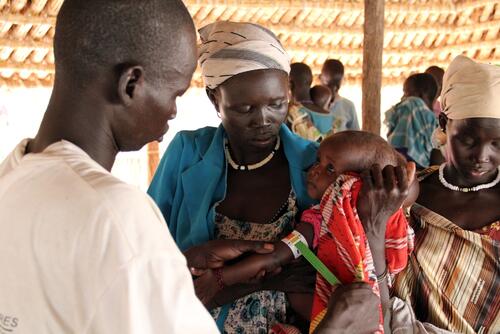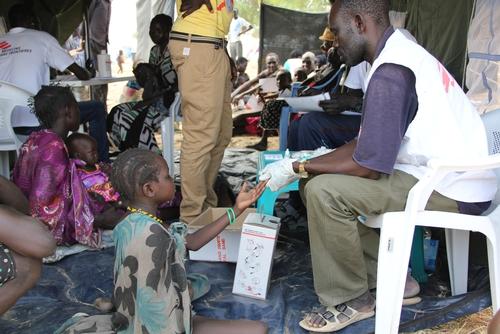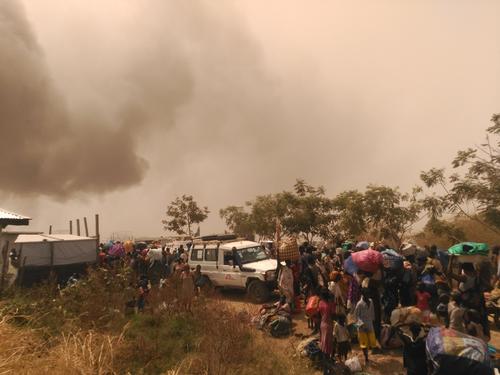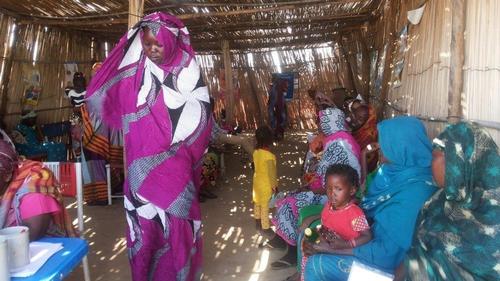Most of the 16 MSF projects in South Sudan were busier than expected during the usually less busy months of March and April. Many of MSF’s hospitals and clinics are working at - or even beyond - normal capacity, even though the rainy season is only just starting. With the coming rains, it is realistic to expect an increase in malaria and water-borne diseases, so we can expect medical needs to rise in an environment where MSF is already working hard to keep up with the current patient numbers. Generally, across the country, MSF is seeing health situations that are concerning, but not alarming. Major disruptions - such as violence, displacement, a breakdown in aid organisations’ access to areas in need, or a significant epidemic outbreak - could have rapid and grave consequences for people’s health in an environment that is already fragile.
MSF employs more than 3,200 South Sudanese staff and more than 330 international staff to respond to a wide range of medical emergencies and provide free and high quality healthcare to people in need in 16 project locations across the country.
Measles
MSF engaged in several preventative or emergency-response measles vaccinations in March and April in response to suspected or confirmed measles cases. Measles is a highly contagious viral disease and one of the leading causes of death among young children worldwide.
In Aweil, in response to a confirmed outbreak that infected 69 children in March and April, MSF vaccinated 18,410 children under five years old in a three-day emergency response campaign in Aweil Town. In April and May, the MSF team in Doro, Maban county, vaccinated 7,021 children between 6 months and 15 years old in the Bunj town community, as a preventive measure in response to some suspect measles cases presenting at the clinic. A coverage survey was done after the mass measles vaccination, confirming overall coverage at 98.9% for this population.
MSF also supported measles vaccinations that were lead by other actors in Abyei region (13,000 children in February) and in Mayom (44,000 children in March) as well as treating 700 measles cases across both locations in March and April. In the region around Old Fangak MSF has been expanding vaccination activities, including immunization against measles. Routine vaccination, as opposed to specific vaccination campaigns, remains a core medical activity in most MSF project locations that run out-patient activities.
MSF in Numbers
1 January – 30 April
235,851
235,851
13,716
13,716
235,851
235,851
13,716
13,716
4,256
4,256
50,974
50,974
7,050
7,05
3,612
3,612
Preparedness for the rainy season
Every year the rainy season brings an increase in numbers of patients presenting with water-borne diseases and malaria. Last year, South Sudan faced a huge peak in malaria cases, particularly in the northwestern regions. MSF, for example, treated a total of 295,000 patients for malaria in 2015 – nearly ten times as many as in 2014. MSF teams have been preparing to respond in case the 2016 rainy season also brings a significantly high burden of malaria.
Malnutrition
MSF medical teams are generally seeing gradually increasing numbers of patients with severe acute malnutrition, in line with what would normally be expected at the start of the traditional ‘hunger gap’ period. In Agok, however, there were between 140 and 150 admissions in both March and April of children with severe malnutrition with medical complications, which is substantially higher than the team would normally expect. Nearby, in Mayom, the team is taking preventive measures and has started an ambulatory nutrition programme, which has admitted around 400 children so far. The medical team in Aweil saw a jump in admissions of severe acute malnourished children up to March and had to open a second severe malnutrition ward, although subsequently the numbers have stabilized.
A gradual increase in admissions has been observed in the ambulatory and intensive malnutrition programmes in Doro Camp and in Pibor, although the percentages of severe acute malnutrition remain below alarming thresholds.
MSF intensive therapeutic feeding centres are always the ‘end of the line’ in situations of malnutrition, when other mechanisms to prevent malnutrition have failed. Therefore current numbers in these MSF treatment programmes should not be considered as a clear indicator of potential malnutrition numbers in the future.
The challenge of continuity of care in a conflict area
In South Sudan, an estimated 2.7 per cent of adults live with HIV, although prevalence can shoot upwards of 6 per cent in some regions. But barely 6 per cent of those in need receive antiretrovirals (ARVs) due to scarcity of available care and high levels of stigma and discrimination.
It is important in medical ethics to ensure continuity of care, particularly for chronic diseases such as HIV where a gap in care can result in serious treatment complications. In conflict affected areas in South Sudan, MSF’s HIV treatment protocol requires that a three months 'runaway' pack of ARV is given to HIV patients just in case of eminent displacement they can run with their medicine.
In Leer, when conflict lead to massive displacement of the population and the MSF hospital was looted, this continuity of care was put to the test. Thanks to extraordinary efforts, 50 patients on ARVs at MSF’s Leer hospital were able to re-establish contact with MSF to resume their life-sustaining HIV treatment.
This can be attributed to concerted efforts by MSF’s Leer Project HIV and TB Supervisor. When he ran for his life towards the relative safety of the bush and swamps, he thought of two things: his family, and his patients. As his patients were already gone, he took what could help them: a bag-load of ARV pills and the book holding his patients’ records. He and his family hid in chest-deep swamps all day, listening to the sound of gunfire.
When the shooting finally subsided, he sent his family all the way to the Bentiu protection camp where they eventually sought refuge, but he himself chose to stay behind to help people using the medicines he’d stashed in his backpack.
Eventually, he was able to reconnect with the MSF medical team in Bentiu, where the book of patient records that he’d saved for over four months was essential in enabling former patients who had fled there to be re-enrolled in their treatment regimens.






